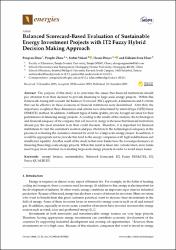| dc.contributor.author | Zhou, Pengran | |
| dc.contributor.author | Zhou, Pengfei | |
| dc.contributor.author | Yüksel, Serhat | |
| dc.contributor.author | Dinçer, Hasan | |
| dc.contributor.author | Uluer, Gülsüm Sena | |
| dc.date.accessioned | 2020-03-05T12:16:16Z | |
| dc.date.available | 2020-03-05T12:16:16Z | |
| dc.date.issued | 2020 | en_US |
| dc.identifier.citation | Zhou, P., Zhou, P., Yüksel, S., Dinçer, H. ve Uluer, G. S. (2020). Balanced scorecard-based evaluation of sustainable energy investment projects with IT2 fuzzy hybrid decision making approach. Energies, 13(1). http://doi.org/10.3390/en13010082 | en_US |
| dc.identifier.issn | 1996-1073 | |
| dc.identifier.uri | http://doi.org/10.3390/en13010082 | |
| dc.identifier.uri | https://hdl.handle.net/20.500.12511/5002 | |
| dc.description.abstract | The purpose of this study is to determine the issues that financial institutions should pay attention to in their decision to provide financing to large scale energy projects. Within this framework, taking into account the Balanced Scorecard (BSC) approach, 4 dimensions and 8 criteria that can be effective in these decisions of financial institutions were determined. After that, the importance weights of these dimensions and criteria were determined by interval type-2 (IT2) fuzzy DEMATEL method. In addition, 3 different types of banks (public, private, foreign) are listed for their performance in financing energy projects. According to the results of the analysis, the technological and financial adequacy of the company that will invest in energy is the issue that financial institutions should pay the most attention to in their credit decision. Therefore, it is important for financial institutions to visit the customer's location and pay attention to the technological adequacy in the process of evaluating the customer's demand for credit for a large-scale energy project. In addition, it would be appropriate not to provide this fund to the energy companies with high indebtedness and insufficient liquidity. Another result of the study is that state banks have the lowest performance in financing these large-scale energy projects. When this result is taken into consideration, state banks need to pay more attention in evaluating large-scale energy projects in order to avoid major losses. | en_US |
| dc.description.sponsorship | The study is supported by National Social Science Foundation of China (19XMZ095). | en_US |
| dc.language.iso | eng | en_US |
| dc.publisher | Multidisciplinary Digital Publishing Institute | en_US |
| dc.rights | info:eu-repo/semantics/openAccess | en_US |
| dc.rights | Attribution 4.0 International | * |
| dc.rights.uri | https://creativecommons.org/licenses/by/4.0/ | * |
| dc.subject | Energy Finance | en_US |
| dc.subject | Sustainability | en_US |
| dc.subject | Balanced Scorecard | en_US |
| dc.subject | IT2 Fuzzy Dematel | en_US |
| dc.subject | IT2 Fuzzy Qualiflex | en_US |
| dc.title | Balanced scorecard-based evaluation of sustainable energy investment projects with IT2 fuzzy hybrid decision making approach | en_US |
| dc.type | article | en_US |
| dc.relation.ispartof | Energies | en_US |
| dc.department | İstanbul Medipol Üniversitesi, İşletme ve Yönetim Bilimleri Fakültesi, Uluslararası Ticaret ve Finansman Bölümü | en_US |
| dc.authorid | 0000-0002-9858-1266 | en_US |
| dc.authorid | 0000-0002-8072-031X | en_US |
| dc.identifier.volume | 13 | en_US |
| dc.identifier.issue | 1 | en_US |
| dc.relation.publicationcategory | Makale - Uluslararası Hakemli Dergi - Kurum Öğretim Elemanı | en_US |
| dc.identifier.doi | 10.3390/en13010082 | en_US |
| dc.identifier.wosquality | Q3 | en_US |
| dc.identifier.scopusquality | Q2 | en_US |



















